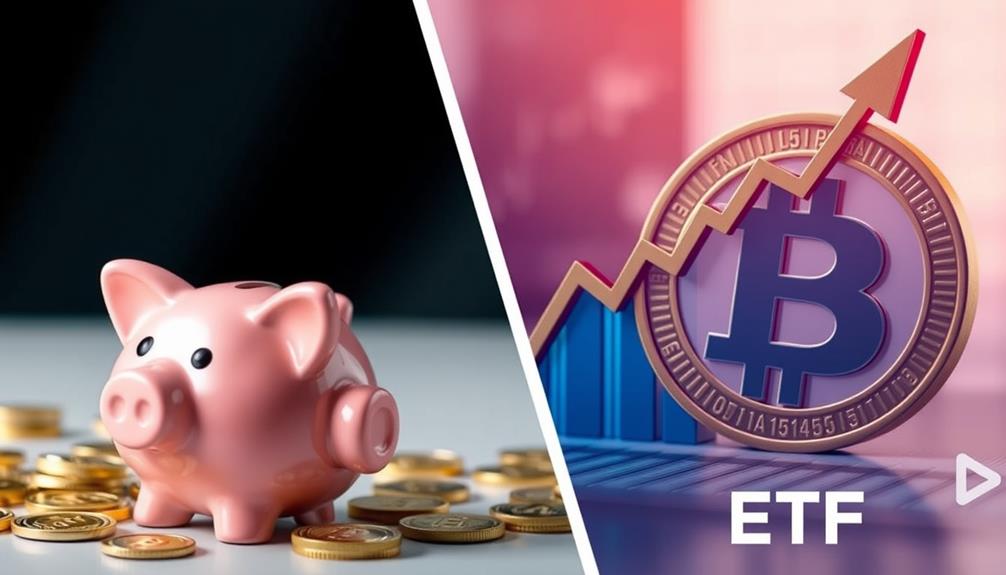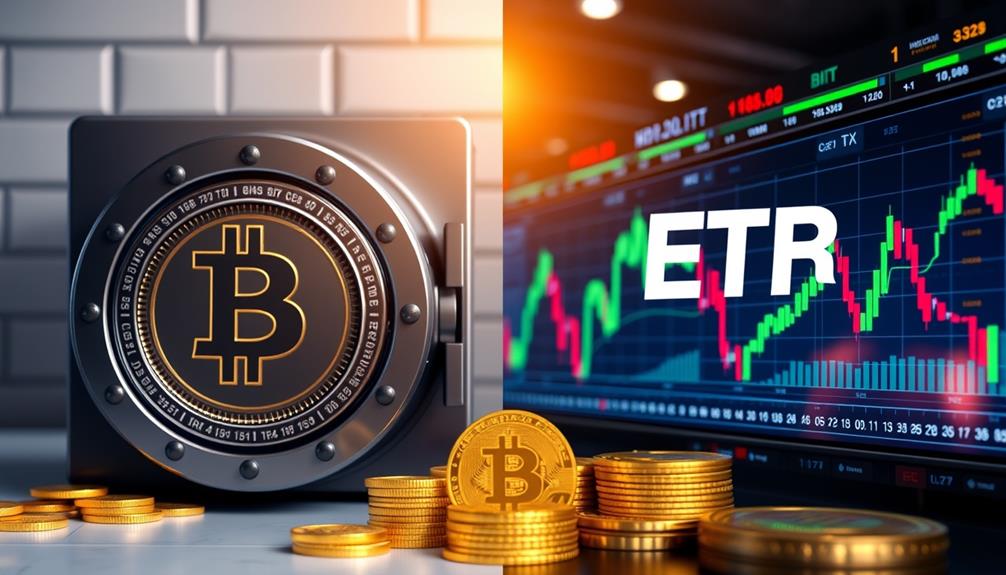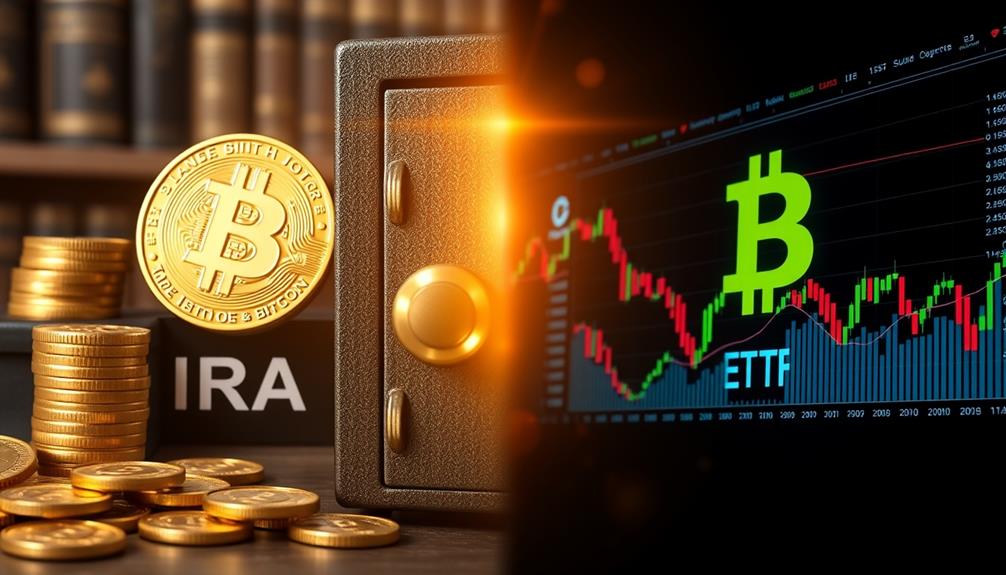When it comes to comparing Bitcoin IRAs and Bitcoin ETFs, Bitcoin IRAs generally provide superior returns. With IRAs, you have direct ownership of Bitcoin, which allows you to take advantage of tax-deferred growth and fully capture the potential gains of price appreciation. On the other hand, Bitcoin ETFs may involve capital gains taxes and offer less flexibility in trading, as they operate only during market hours. Although ETFs may be easier to use, they tend to result in lower returns in the long run. If you are weighing your options to determine which one best fits your investment strategy, gaining more insights could help you make a more informed decision.
Key Takeaways
- Bitcoin IRAs offer tax-deferred growth, potentially enhancing overall returns compared to taxable Bitcoin ETFs.
- Direct ownership in Bitcoin IRAs allows investors to fully benefit from Bitcoin's price appreciation.
- Roth Bitcoin IRAs provide tax-free withdrawals, increasing net returns for long-term investors.
- Bitcoin IRAs enable 24/7 trading flexibility, while ETFs are limited to regular market hours.
- Historical performance suggests Bitcoin IRAs may yield greater long-term growth than ETFs focused primarily on short-term trading.
Overview of Bitcoin ETFs

Bitcoin ETFs represent a streamlined way to invest in the cryptocurrency market without the hassles of owning Bitcoin directly. These investment vehicles allow you to gain exposure to Bitcoin through an easy-to-trade option on stock exchanges.
As of January 2024, the SEC approved 11 spot Bitcoin ETFs that hold Bitcoin directly, marking a notable development in this space. The first of these spot Bitcoin ETFs began trading on January 11, 2024.
Additionally, as investors seek diversification in their portfolios, many are considering alternative assets such as gold, which can provide a hedge against market volatility and inflation, similar to the role of Gold IRAs.
Before these approvals, Bitcoin strategy ETFs existed, which tracked Bitcoin prices indirectly by investing in futures contracts and mining stocks. However, this often led to performance deviations from actual Bitcoin prices, making them less appealing for some investors.
When considering Bitcoin ETFs, it's essential to pay attention to their fee structures. Some of the lowest fees, such as 0.19% for Franklin Templeton Digital Holdings Trust and 0.20% for Bitwise Bitcoin ETF and VanEck Bitcoin Trust, can greatly influence your investment decisions.
Ultimately, Bitcoin ETFs provide a convenient way to participate in the cryptocurrency market while maneuvering its complexities more easily.
Understanding Bitcoin IRAs

Investing in a Bitcoin IRA offers you the opportunity for direct ownership of Bitcoin while enjoying potential tax-deferred growth. Unlike traditional investments, you won't incur capital gains taxes until you withdraw your funds. Opening a Bitcoin IRA is quick—taking just about three minutes—by transferring, rolling over, or making new contributions.
With a Bitcoin IRA, you can diversify your portfolio by investing in a variety of cryptocurrencies, not just Bitcoin. Plus, you benefit from 24/7 trading, allowing you to respond immediately to market changes, unlike traditional stock trading hours.
Here's a quick comparison of Bitcoin IRAs and Bitcoin ETFs:
| Feature | Bitcoin IRA | Bitcoin ETFs |
|---|---|---|
| Ownership | Direct ownership of Bitcoin | Indirect ownership |
| Trading Hours | 24/7 trading | Limited to market hours |
| Tax Benefits | Tax-deferred growth | Taxable gains upon sale |
Bitcoin IRAs are subject to IRS regulations, ensuring compliance while granting you more control over your investments compared to Bitcoin ETFs. This flexibility makes a Bitcoin IRA a compelling choice for cryptocurrency enthusiasts.
Key Differences in Investment

Differentiating between a Bitcoin IRA and a Bitcoin ETF reveals essential aspects of your investment strategy.
Bitcoin IRAs provide direct ownership of Bitcoin, allowing for tax-deferred growth and the potential to fully capture Bitcoin's price increases. In contrast, Bitcoin ETFs offer indirect exposure through shares, which means you'll incur capital gains taxes upon sale, affecting your overall returns.
It's crucial to recognize that understanding the risks and rewards of Bitcoin IRAs can further enhance your investment decision-making.
When it comes to trading flexibility, Bitcoin IRAs allow for 24/7 trading and management options like staking and DeFi, while Bitcoin ETFs are restricted to stock exchange hours, limiting your interactions with the underlying assets.
Additionally, Bitcoin IRAs support a diversified portfolio, enabling you to invest in multiple cryptocurrencies, whereas Bitcoin ETFs typically focus solely on Bitcoin or related assets.
Your investment strategy will differ considerably too.
Bitcoin IRAs are oriented towards long-term growth and retirement savings, making them suitable for those focused on building wealth over time. On the other hand, Bitcoin ETFs cater to short-term trading opportunities and market speculation, which can lead to performance deviations due to management fees and reliance on futures contracts.
Understanding these key differences can help you make informed choices in your investment journey.
Evaluating Potential Returns

When considering potential returns, the choice between a Bitcoin IRA and a Bitcoin ETF can greatly impact your financial outcomes.
Bitcoin IRAs offer tax-deferred growth, allowing you to defer taxes on gains until you make withdrawals, potentially enhancing your overall returns. In contrast, Bitcoin ETFs incur capital gains taxes as you sell shares, which can diminish your net returns. Additionally, many investors appreciate the educational resources provided by companies like Noble Gold, which can help you navigate the complexities of precious metal investments in conjunction with cryptocurrencies offers a range of precious metal investment options.
With direct ownership of Bitcoin in a Bitcoin IRA, you fully capture the upside of Bitcoin price appreciation. This structure supports a long-term investment strategy, letting you ride out market fluctuations without immediate tax implications.
Historical performance shows significant growth in Bitcoin, making this approach appealing for those focused on long-term gains.
Additionally, if you opt for a Roth Bitcoin IRA, you may enjoy tax-free withdrawals, further boosting your net returns compared to the taxable nature of profits from Bitcoin ETFs.
This tax advantage, combined with the potential for appreciation and a carefully crafted investment strategy, positions Bitcoin IRAs as a more lucrative option for long-term investors compared to Bitcoin ETFs, which often cater to short-term trading strategies.
Risks and Considerations

Cryptocurrency investments, whether through a Bitcoin IRA or a Bitcoin ETF, come with their own set of risks and factors that you should keep in mind. The volatility of Bitcoin can lead to significant price swings, which means you could see substantial gains or total investment losses.
Additionally, understanding the importance of selecting the right investment strategy is essential for effective financial management, similar to how one must weigh cold medications for effective relief during illness.
Here are some key risks to evaluate:
- Regulatory Risks: Bitcoin ETFs are under the scrutiny of regulatory bodies like the SEC, while Bitcoin IRAs must comply with IRS regulations.
- Custodianship Concerns: Both investment vehicles rely on custodians for asset security, which can pose risks if those custodians aren't properly regulated.
- Management Fees: Bitcoin ETFs usually charge management fees ranging from 0.19% to 1.50%, which can eat away at your investment returns. Bitcoin IRAs may also have varied fee structures.
- Tax Implications: Gains from Bitcoin ETFs are subject to annual capital gains tax, whereas Bitcoin IRAs can offer tax-deferred growth or tax-free withdrawals, making tax factors essential.
Understanding these risks can help you make informed decisions about your investment strategy, whether you choose a Bitcoin IRA or a Bitcoin ETF.
Frequently Asked Questions
Is Bitcoin IRA Worth It?
Whether a Bitcoin IRA's worth it depends on your investment goals. If you seek tax-deferred growth and control over your assets, it could be a valuable option. Just consider the setup process and potential fees involved.
Which Bitcoin ETF Is Most Successful?
When comparing success among Bitcoin ETFs, the Franklin Templeton Digital Holdings Trust stands out with its low fee and solid performance. In contrast, Grayscale's high fee might hold back potential investors seeking better returns.
Which Is Better, Bitcoin or Bitcoin Etf?
When considering which is better, Bitcoin or a Bitcoin ETF, you'll find that direct ownership of Bitcoin offers greater control and potential returns, while ETFs provide a more passive investment approach with less involvement.
What Is the Safest Way to Invest in Bitcoin?
Imagine holding your Bitcoin in a secure vault, untouched by market whims. To invest safely, consider a Bitcoin IRA, where you gain control, enjoy tax benefits, and shield your assets with exceptional security measures.
Conclusion
In the end, choosing between a Bitcoin IRA and a Bitcoin ETF is like picking between two paths in a dense forest. Each route holds potential treasures, but they also come with hidden pitfalls. As you navigate your investment journey, remember that both options can lead to prosperity or loss. Trust your instincts, weigh the risks, and let your financial compass guide you toward the sunlight of better returns. Your choice can illuminate your future in the world of crypto.









